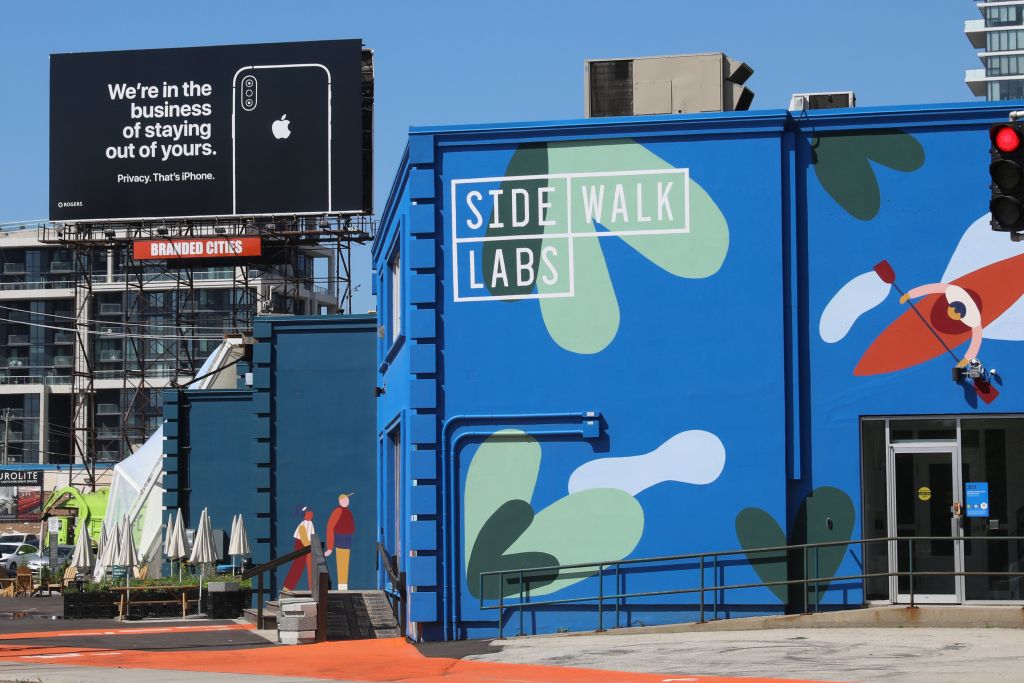
Sidewalk Labs, the embattled urban planning subsidiary of Alphabet, is officially folding back into Google as its CEO steps down with health concerns. The news follows a history of bad press for the company over data privacy in the smart city space, which had led Sidewalk to attempt to distance itself from the search giant.
In a blog published on Wednesday Sidewalk Labs CEO Daniel L. Doctoroff announced that he will be stepping down after being diagnosed with Amyotrophic Lateral Sclerosis (ALS, also known as Lou Gehrig’s disease). As a result, the company which he launched within Google in 2015, and which at the moment belongs to Google parent company Alphabet, will once again become part of the Mountain View family.
Until now, Sidewalk Labs has tried hard to emphasise that it is not formally part of Google. It has often gone so far as to contact journalists who mention its links to the gigantic search advertiser and attempt to get coverage amended: this has happened to us here at Verdict. Sidewalk’s smart-city plans have suffered from the perception of Google involvement, particularly in the case of a proposed venture in Toronto, Canada, which caused a massive public backlash. The citizens of Toronto didn’t so much object to living in a data-powered smart city, as to the idea that Google would have access to all that data.
Sidewalk’s venture into modern wooden (aka “mass timber”) buildings, known as Canopy Buildings, will be spun out by Alphabet as an independent company. Apart from the Internet of Things (IoT) and other such IT-based concepts, wood-framed skyscrapers may be a popular concept in the smart, eco-conscious cities of tomorrow. Wood is potentially a low- or even negative-carbon material if produced by sustainable forestry, at least compared to the concrete and steel typically used for the frames of large buildings today. That said there are some caveats to the idea: the most common form of mass timber needs a lot of kiln heating in production, for instance.
Sidewalk: The lab that doth protest too much?
In any case, Sidewalk Labs is a data company as well as a timber one. Its recent troubles arguably began with the much-publicised failure of its Quayside project in the city of Toronto.
First proposed in October 2017 as a 12-acre neighbourhood, Quayside aimed to become a truly smart city with features such as “snow-melting roadways”, an “underground delivery system” and homes that used cutting-edge wood frames to make housing more affordable.
How well do you really know your competitors?
Access the most comprehensive Company Profiles on the market, powered by GlobalData. Save hours of research. Gain competitive edge.

Thank you!
Your download email will arrive shortly
Not ready to buy yet? Download a free sample
We are confident about the unique quality of our Company Profiles. However, we want you to make the most beneficial decision for your business, so we offer a free sample that you can download by submitting the below form
By GlobalDataAs Verdict explored in a look at smart city power grabs by Big Tech, that vision began to unravel over the following years. First, tensions mounted when Sidewalk Labs increased the size of the neighbourhood to 190 acres. There were also disagreements between Sidewalk and Waterfront Toronto, the organisation managing the renovation. But the biggest backlash came from residents, who feared that their data would be collected and stored by Google.
Despite promises by Google that citizens’ data wouldn’t be shared with third parties, the backlash continued. The project eventually closed in May 2020, with the Covid-19 pandemic given as a reason. But as a recent report on smart cities from analytics firm GlobalData argues, the true reason for its demise was data privacy.
“The public mistrust over Google offshoot Sidewalk Labs’ bid to turn a parcel of land on Toronto’s waterfront into a showcase smart city project is a prime example of how public perceptions of what was once an eye-opening plan can change, with Torontonians having second thoughts about inviting one of the world’s most notorious data harvesters to experiment in their backyard,” analysts report.
Sidewalk Labs representatives have maintained, including in conversations with Verdict regarding our coverage, that it abandoned the project because of Covid uncertainties.
“We don’t dispute that the public raised important data privacy concerns around the project,” a Sidewalk Labs spokesperson told Verdict this summer.
“It is factually inaccurate to state that those concerns contributed to the end of the project, since we publicly announced project alignment with our partner, Waterfront Toronto, on digital governance issues in Fall 2019.”
Sidewalk Labs’ representative also reminded your correspondent that Sidewalk Labs then belonged to Google’s owner Alphabet, not Google, and that the company felt it should not be described as “Google’s Sidewalk Labs”.
As of today, it’s quite clear that Sidewalk Labs is indeed, formally as well as practically, Google’s. Verdict raised this fact with Sidewalk in the course of preparing this article. The company’s representative declined to comment.
“It seems like Sidewalk Labs has kept a lower profile over the last year or so, (having) never really recovered from the publicity over Toronto,” says David Bicknell, principal thematic analyst for GlobalData. “Quietly folding into Google is a bit of an ignominious end.”
“To most with an opinion, Sidewalk Labs was at least a Google affiliate. It’s no surprise, in the wake of Dan Doctoroff’s health concerns, that it should be folded into Google.
“We wish Dan Doctoroff well, of course,” Bicknell adds.
Giving his own thoughts on the Quayside scheme, Doctoroff is, perhaps unsurprisingly, more positive, writing in his blog: “Our comprehensive vision for Toronto provided a global blueprint for climate-positive development.”
Welcome to Alphabet’s urban jungle
The failure of the Sidewalk Labs smart city experiment may raise privacy questions about Google’s plans for urban development. But the smart city has also often been touted as a way for cities to go green, and it seems Google is doubling down on that with its positioning of Sidewalk Labs under the urban sustainability umbrella.
Doctoroff’s blog post reveals that Google will acquire several of Sidewalk Labs’ products and focuses: Pebble (smart mobility), Mesa (building energy), Delve (development planning), Affordable Electrification (home energy), and Canopy Buildings (factory-automated mass timber construction). These products will continue to be led by Sidewalk Labs’ President of Urban Products Prem Ramaswami and its CTO Craig Nevill-Manning, both Google alumni like Doctoroff himself.
“Separately, recognizing the importance of more sustainable construction approaches, Alphabet will assist Canopy Buildings in becoming an independent company,” adds the former CEO, who notes these products were originally developed as part of the controversial Quayside project.
So Alphabet, not Google, will acquire Canopy Buildings as a new tentacle. This could suggest a continued desire to disassociate Google from any timber skyscrapers that may pop up in city developments.
“Spinning out Canopy Buildings seems a smart ESG-friendly move,” Bicknell tells Verdict. “Given the demise of Sidewalk Labs, if Google is spinning out Canopy Buildings, it will need it to be an ESG success story.”
While Sidewalk Labs itself may be part of Google again, the same can’t be said about some of its other spinoffs of recent years: healthcare disruptor Cityblock Health, tech-enabled infrastructure operation Sidewalk Infrastructure Partners and the transportation planning brand Replica.
Even so, Replica has been embroiled in a Quayside-esque uproar of its own regarding data privacy, this time relating to the US city of Portland. What this means for the smart city legacy of Sidewalk Labs remains uncertain, especially as there are bigger issues now for cities to contend with.
“Smart cities had their time,” Bicknell continues. “They are no longer about glossy, sensor-driven metropolises. The pandemic has seen to that.
“City society has been brought almost to its knees by the impact of the pandemic. We’re seeing that again with the impact of new Covid variants. Cities have yet to reboot their natural rhythm; it may be a while before they do.
“The impact of the pandemic and climate change now means smart cities cannot just be ‘smart’ – they must be resilient and sustainable, too. Data privacy is a key concern, in cities like Toronto and Portland, and beyond. But the obstacle now is the impact of the pandemic on cities and their finances – not just data privacy.”






